

Grammar


Tenses


Present

Present Simple

Present Continuous

Present Perfect

Present Perfect Continuous


Past

Past Simple

Past Continuous

Past Perfect

Past Perfect Continuous


Future

Future Simple

Future Continuous

Future Perfect

Future Perfect Continuous


Parts Of Speech


Nouns

Countable and uncountable nouns

Verbal nouns

Singular and Plural nouns

Proper nouns

Nouns gender

Nouns definition

Concrete nouns

Abstract nouns

Common nouns

Collective nouns

Definition Of Nouns

Animate and Inanimate nouns

Nouns


Verbs

Stative and dynamic verbs

Finite and nonfinite verbs

To be verbs

Transitive and intransitive verbs

Auxiliary verbs

Modal verbs

Regular and irregular verbs

Action verbs

Verbs


Adverbs

Relative adverbs

Interrogative adverbs

Adverbs of time

Adverbs of place

Adverbs of reason

Adverbs of quantity

Adverbs of manner

Adverbs of frequency

Adverbs of affirmation

Adverbs


Adjectives

Quantitative adjective

Proper adjective

Possessive adjective

Numeral adjective

Interrogative adjective

Distributive adjective

Descriptive adjective

Demonstrative adjective


Pronouns

Subject pronoun

Relative pronoun

Reflexive pronoun

Reciprocal pronoun

Possessive pronoun

Personal pronoun

Interrogative pronoun

Indefinite pronoun

Emphatic pronoun

Distributive pronoun

Demonstrative pronoun

Pronouns


Pre Position


Preposition by function

Time preposition

Reason preposition

Possession preposition

Place preposition

Phrases preposition

Origin preposition

Measure preposition

Direction preposition

Contrast preposition

Agent preposition


Preposition by construction

Simple preposition

Phrase preposition

Double preposition

Compound preposition

prepositions


Conjunctions

Subordinating conjunction

Correlative conjunction

Coordinating conjunction

Conjunctive adverbs

conjunctions


Interjections

Express calling interjection

Phrases

Sentences

Clauses

Part of Speech


Grammar Rules

Passive and Active

Preference

Requests and offers

wishes

Be used to

Some and any

Could have done

Describing people

Giving advices

Possession

Comparative and superlative

Giving Reason

Making Suggestions

Apologizing

Forming questions

Since and for

Directions

Obligation

Adverbials

invitation

Articles

Imaginary condition

Zero conditional

First conditional

Second conditional

Third conditional

Reported speech

Demonstratives

Determiners

Direct and Indirect speech


Linguistics

Phonetics

Phonology

Linguistics fields

Syntax

Morphology

Semantics

pragmatics

History

Writing

Grammar

Phonetics and Phonology

Semiotics


Reading Comprehension

Elementary

Intermediate

Advanced


Teaching Methods

Teaching Strategies

Assessment
Searching for days
المؤلف:
L.A Hill
المصدر:
Elementary Steps To Understand
الجزء والصفحة:
14-1
24/10/2022
1816
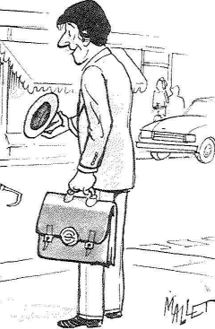
Jack worked in an office in a small town. One day his boss said to him. Jack, I want you to go to Manchester, to an office there, to see Mr. Brown. Here's the address."
Jack went to Manchester by train. He left the station, and thought, the office isn't far from the station. I'll find it easily.'
But after an hour he was still looking for it, so he stopped and asked an old lady. She said, 'Go straight along this street, turn to the left at the end, and it's the second building on the right.' Jack went and found it.
A few days later he went to the same city, but again he did not find the office, so he asked someone the way. It was the same old lady! She was very surprised and said, 'Are you still looking for that place?"
A Which of these sentences are true (T) and which are false (F)? Write T or F.
- Jack worked in an office in a large town.
- Jack's boss wanted him to go to Manchester.
- Jack did not have the address of the office in Manchester.
- Jack did not find the office easily.
- Jack went to Manchester again a few months later.
- He asked the same old lady the way again.
B Answer these questions.
- What did Jack's boss want him to do?
- How did Jack go to Manchester?
- What did he think as he left the station?
- What happened then?
- What did the lady say to Jack?
- Where did he go a few days later?
- What happened to him again?
- Whom did he ask the way?
C There are two sentences under each picture. Choose the correct one each time and write it down.
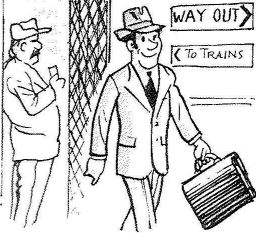
a. Jack is arriving at the station.
b. Jack is leaving the station.
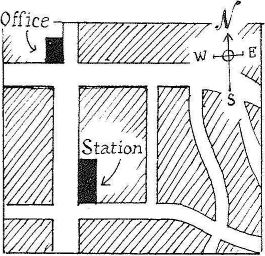
a. This office is north of the station.
b. This office is south of the station.
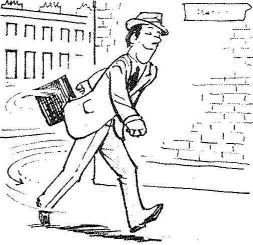
a. Jack is turning left at the end of the street.
b. Jack is turning right at the end of the street.
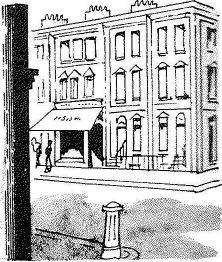
a. The second building on the left is a shop.
b. The third building on the left is a shop.
 الاكثر قراءة في Elementary
الاكثر قراءة في Elementary
 اخر الاخبار
اخر الاخبار
اخبار العتبة العباسية المقدسة

الآخبار الصحية















 قسم الشؤون الفكرية يصدر كتاباً يوثق تاريخ السدانة في العتبة العباسية المقدسة
قسم الشؤون الفكرية يصدر كتاباً يوثق تاريخ السدانة في العتبة العباسية المقدسة "المهمة".. إصدار قصصي يوثّق القصص الفائزة في مسابقة فتوى الدفاع المقدسة للقصة القصيرة
"المهمة".. إصدار قصصي يوثّق القصص الفائزة في مسابقة فتوى الدفاع المقدسة للقصة القصيرة (نوافذ).. إصدار أدبي يوثق القصص الفائزة في مسابقة الإمام العسكري (عليه السلام)
(نوافذ).. إصدار أدبي يوثق القصص الفائزة في مسابقة الإمام العسكري (عليه السلام)


















